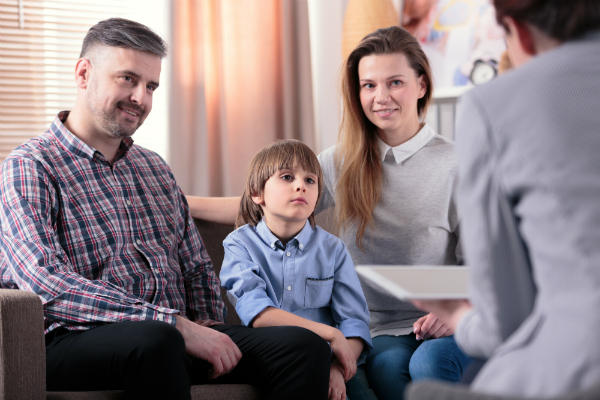When a marriage ends, the whole family feels the effects. Children, in particular, can have a range of reactions depending on their age and personality. Overall, children need stability, safety, and love to thrive. All these things might be even easier to achieve outside the confines of a broken marriage. Let us walk through how child divorce counseling can help make this transition all that much smoother.
Child Counseling Before Divorce
Children will eventually adjust to a separation; however, they need the opportunity to address any feelings they might have about the divorce. That is why it is essential to keep them informed at every step of the process. Once you and your partner have decided that separation is the right way, it is time for some tough conversations with your child or children.
You may work with a family counselor at this point. This article can provide helpful tips if you are unsure if your child needs to see a therapist. A family counselor can help you plan to break the news. You and your partner must be a united front on this one issue, as your child is the most affected by your impending separation. A counselor will help you work through your child’s initial reaction. Some things you will need to be prepared to do is:
- Respect that your child may not be happy about this change
- Encourage them to talk about how they feel, even negative feelings
- Assure them they are loved by both of you, and that will not change
- Let them know that they can expect continued support from you both
- Handle the “why are you splitting up” question
Depending on your child’s age, you might get very different reactions to the news. Younger children might be very accepting as their ability to comprehend how this will impact their lives in the future is limited. We often use Play Therapy in instances when children are too young to understand what is happening. On the other hand, middle school-aged children might experience grief over the end of the marriage, which they might be working through for the first time. Depending on their maturity level and coping skills, older kids and adolescents can have more unpredictable reactions. Regardless of their age, this transition will be painful for them. It is your job as the parents to keep the core message the same – we love you, and they are not to blame for the end of your relationship.
Child Counseling During Divorce
Counseling during the divorce is more focused on managing expectations and establishing a new family dynamic. Hopefully, your separation is amicable, but often this is not the case. You and your soon-to-be ex-spouse are working through some significant challenges. It can be hard not to misplace your stress and frustration at times. Children exposed to intense anger and hostility from one parent to the other can cause emotional dysregulation. These children often have difficulty controlling their emotions and are more likely to experience anxiety.
A strategic family counselor can help you overcome some of these impulses for the good of your child. You can learn to be more aware of your emotional responses to stress and how you manage your relationship with your ex-spouse going forwards. A family counselor might suggest:
- Therapy sessions for your child to work through feelings of anger and fear and gain support for this change in the family dynamic
- Counseling sessions with each of you and your child separately to re-establish the parent-child connection
- Counseling sessions between you and your ex-spouse where you can work through feelings of grief and transition to a co-parenting relationship
Child Counseling After Divorce
At this point, the divorce is final, but your relationship with your ex is far from over. At this stage, you and your ex are learning to become co-parents. You might continue counseling after a divorce to help your child adjust to their “new normal.” The challenges of having divorced parents can impact their social lives, academics, and their self-identity. A family counselor can offer your child a communication outlet and emotional support. A counselor can play an essential role in helping your child:
- Deal with the trials of having two parents in separate homes
- Work to improve communication patterns for proper expression.
- Continue to strengthen their bond with each parent individually without feeling guilt.
- Help them process new transitions, such as if their parents begin dating or remarrying
- Catch any signs of mental health issues early on before they cause unneeded distress in your child
Conclusion
A whole family is affected by divorce, but no one more than your child. Child divorce counseling can help your child adjust to their parents’ “new normal” of being separated. A family counselor can help you plan how to break the divorce news and navigate the emotional stressors of finalizing the divorce. In addition, your child’s counselor can be a continued source of support as they work through new challenges and transitions in their life. Through a counselor’s help, you can ensure your child has a stable, safe, and loving environment in which to thrive.
Family Strategies Counseling & Mediation is a therapy office serving the Chicagoland Area. We offer couples counseling and mental health services. Our therapists are skilled at working with those struggling to process traumatic events. Call our office at (708) 798-5433 or email us at info@Family-Strategy.com for appointment details.
More Child Therapy Posts
Early Warning Signs for a Child in Need of Mental Health Counseling
Children can develop the same mental health conditions as adults. However, they often display these symptoms differently. It can be difficult to identify mental health disorders in children because normal childhood development is a process that involves significant...
List of Co-Parenting Boundaries After a Separation
Co-parenting is an arrangement made by two people raising a child together but living in separate homes. You must decide about your child's education, medical care, and other essential things with someone you may not like or agree with. Setting clear co-parenting...
Does Your Child Need to See a Therapist?
Knowing when a child needs to see a therapist can be tricky. Kids don't always have the emotional control or communication skills to verbalize their needs or feelings. During difficult times, kids may think they must protect their parents and not add to their pain....




